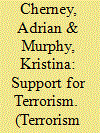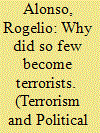| Srl | Item |
| 1 |
ID:
163206


|
|
|
|
|
| Summary/Abstract |
How do individuals join Islamist extremist groups? Why do individuals support such groups? What factors contribute to a decision to join? What are the pathways into Islamist extremist groups? Drawing on examples from Pakistan, Bangladesh, Indonesia and the Philippines, the articles in this special issue address these critically important questions drawing on original fieldwork, new datasets and large scale national survey research. These articles explore the experiences and perceptions of men and women, South and Southeast Asians, living in majority Muslim and non-Muslim nations. Collectively, they illustrate the importance of social bonds&kinship ties, friendship, teacher-student ties and online relationships in creating a powerful sense of community that fosters a sense of belonging and eventual commitment. The goal of this special issue is to highlight the contributions that Asian cases can make to the often Middle Eastern and European-centric discourses on radicalization, joining and support for militancy.
|
|
|
|
|
|
|
|
|
|
|
|
|
|
|
|
| 2 |
ID:
169923


|
|
|
|
|
| Summary/Abstract |
Passive support for terrorism refers to expressions of sympathy for acts of terrorism and/or the justifications (ideology) used by terrorist groups to legitimise their beliefs and actions. One form of passive support is whether Muslims feel terrorists have valid grievances. Appealing to a sense of grievance is a key way that violent Islamists attempt to recruit fellow Muslims to their cause. Using survey data collected from 800 Muslims living in Australia, this paper examines factors that lead Muslims to believe that terrorists have valid grievances. Factors examined include beliefs in jihad and attitudes towards counterterrorism policing and laws. Other variables included in the analysis are social identity, age, gender, income, religious denomination (Sunni vs. Shia), religious commitment, i.e., Mosque attendance, and recent contact with police. The most significant predictor of passive support for terrorism was found to be particular beliefs in jihad. The perceived legitimacy of counterterrorism laws and trust in police were also important. Implications for countering extremist ideology and generating community cooperation in counterterrorism will be considered.
|
|
|
|
|
|
|
|
|
|
|
|
|
|
|
|
| 3 |
ID:
190936


|
|
|
|
|
| Summary/Abstract |
This article responds to the following research question: if a large number of people experienced in Northern Ireland and the Basque Country the same root causes that increased the likelihood of becoming involved in terrorism, why did so few become terrorists? The article provides an exploratory study of the factors that prevented individuals from joining terrorist organizations in the United Kingdom and Spain, where intense campaigns of violence took place since the late sixties for four decades. The article is based on twenty-seven semi-structured in-depth interviews with men and women who refrained from resorting to terrorism despite sharing similar structural and personal features with those who decided to engage in terrorism. It identifies a combination of inhibitor factors that prevented individuals from following terrorist pathways despite sharing some predisposing risk factors with those who did engage in terrorism as members of organizations like the IRA, the UVF, the UFF and ETA. It also assesses why some types of radicalization developed into violence while others did not as a result of certain barriers.
|
|
|
|
|
|
|
|
|
|
|
|
|
|
|
|